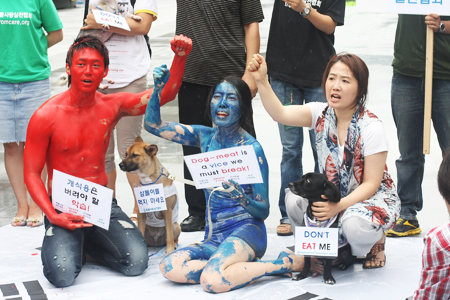Dog lovers vs. dog eaters

Members of animal rights group Coexistance of Animal Rights on Earth (CARE) hold a rally to protest the consumption of dog meat at Gwanghwamun, central Seoul, on July 18, which was “chobok,” one of the three hottest days of the year. The protestors painted their bodies red and blue — the colors symbolizing the “taegeuk” mark on the Korean national flag — signifying that Korea should abolish the culinary tradition. (Photo : CARE)
“Park, Park, wherever you may be, you might eat dogs in your own country, but it could be worse, you could be Scouse, eating rats in a council house (Liverpool).”
This chant is heard from jeering football fans in England when Park Ji-sung, who has joined QPR from Manchester United, is on the ball, and underscores the image of Korea as a nation that enjoys eating dog meat.
Although the chief target of the song is Liverpool, it’s fairly clear that the song is based on the perceived notion that Koreans are uncivilized because they eat dogs.
Koreans’ consumption of dog meat can be traced back to ancient times. Although no one knows exactly when the practice began, some historical clues like a 1,500-year old mural in South Hwangghae Province provides a glimpse of how long it has been a custom of people in this country.
The long-established eating of dog meant first encountered a serious challenge when the government left dogs off the list of animals governed by the Sanitary Process of Livestock Products Act in 1978 because of mounting opposition to it as the nation sought to host major international sports events such as the 1986 Seoul Asian Games and the 1988 Seoul Olympics.
“That was the point when controversy over the eating of dog meat began to surface,” said Choi Young-in, secretary general of Korean Dog Meat Association (KDMA). “From that point on, a culture of keeping pets also started to spread across the nation, and people began to distinguish dogs from other animals.”
Since then, the argument concerning the culture of eating dog meat has reached a point at which more people see it as an uncivilized and barbaric custom that has to be stopped somehow.
Although many arguments from animal rights activists against animal slaughter sound legitimate, the bone of contention still lies in whether dogs should be considered as “special” animals that deserve treatment different to others.
How much does the eating of dog meat differ from eating pork, beef or chicken?
Those against eating dog meat say dogs are closer to human beings and that they are more intelligent than the other animals we consume as food.
Closest Companions
As our closest companions, the consumption of dogs should be banned, said Park So-youn, head of the Coexistence of Animal Rights on Earth (CARE), a domestic animal activist group.
“Times change and cultures change. Today we are living in a society in which dogs have become companions. They are like family members. Therefore eating them can no longer be acceptable,” said Park.
Although people say that there are those that are bred specifically for the purpose of being eaten, other dogs often end up being killed for the same reason, she said.
“Most female dogs at breeding farms that become infertile end up being killed for consumption. Ailing dogs at pet stores or dogs at centers for abandoned animals also suffer the same fate, because euthanizing them costs money,” said Park.
According to CARE, there are around 10 million pet dogs and approximately 4 million households which own these dogs across the nation.
“When I say we should stop killing dogs for meat consumption purposes, it doesn’t mean that killing and eating cows, pigs and chicken is okay,” she said. “I think humanity should gradually reduce its consumption of meat, but dog meat should be the first to be banned, since dogs are our closest companions.”
Some people say that many cases of abuse take place at dog farms and butchers, because dogs are not registered as livestock and therefore the government is unable to monitor how they are cared for and eventually processed.
The group staged a protest opposing the consumption of dog meat at Gwanghwamun, central Seoul, July 18. That day was “chobok,” or one of the three hottest days of the year when dog meat is popularly consumed as stamina food to help people endure the heat.
The members will also hold another protest rally at Moran Market in Seongnam, Gyeonggi Province, one of the nation’s largest dog meat markets, this Saturday, the second of the three dog days.
A butcher was recently booked on charges of injecting water into the veins of dogs in order to increase their weight. And at dog farms, dogs are crammed into and confined to tiny pens, where they end up biting and injuring each other.
“Unlike cows, pigs and chickens which are peaceful grass-eating creatures, dogs are relatively more aggressive, and therefore keeping them in pens is inappropriate,” said Park. “Moreover, outbreaks of diseases that have been occurring at livestock farms are also likely to break out at dog farms because dog viruses also exist.”
But above all, the reason that Park opposes the idea is that once they are registered as livestock, they are no longer regarded as animals and are destined to live miserable lives until slaughtered.
“Livestock become an exception to animal rights,” said Park. “That is why dogs cannot be registered as livestock. The only way to really care about dogs is to ban consumption of their meat,” she said.
Cultural relativism
Since the argument between former French actress and fashion model Brigitte Bardot and a premier broadcast announcer Son Seok-hee stirred up a huge debate among Koreans across the country, the issue has entered a new phase.
Now, the argument over eating dog meat is situated between two cultural standpoints. One is cultural relativism; the other universal ethics concerning animal welfare.
People who eat dogs argue that there is little difference between dogs and cows, pigs or chickens that people commonly consume.
“Those who keep insisting dog should not be eaten because they are companion animals, should be aware how cows and pigs are slaughtered first before criticizing Koreans,” said Phoebe Merkel Kim, a Korean American web designer.
She said if someone wants to condemn those people for eating dog meat, they have to criticize those people who eat other types of meat too.
“Besides, some forms of food eaten in other societies could be considered barbarous, too. Foie gras and shark’s fin are also cruelly sourced food for me, as those animals are also abused in order to be eaten,” she said.
Some also side with dog eaters as long as the dogs are raised on farms for the purpose of being eaten.
“Personally I have no problem with the consumption of dog meat, provided the animals are raised specifically for that purpose. Just because some dogs are kept as companion animals, it doesn’t mean that others cannot be used for food purposes. Some people keep pigs and cows as pets,” said Said Yum Sang-min, a marketing director of a company based in Seoul.
Yum understands the viewpoints of those who are against all meat consumption. If someone says it’s wrong to eat all kinds of meat, then he can respect their views.
However, he cannot understand people who freely eat other meat such as beef, pork, and chicken, but who say it’s morally wrong to eat dog.
“There are many studies that show pigs to be very intelligent animals. How is it any different?” he said.
Yum said it obviously can be a government regulation issue, as some facilities where animals are raised before consumption are unsanitary and even abusing animals. In that sense, it is the government’s job to ensure that proper standards are kept, he said.
“I think more than anything, people are against eating dog because of emotional ties. There is absolutely no logic in singling out dog meat whatsoever. It’s a purely emotional reaction.” Yum said.
Some other advocates for dog meat eating say that it is unfair that animal rights groups target only dog meat eaters.
Choi, the secretary general of the KDMA, said, “What frustrates me the most is the fact that organizations that are supposed to protect rights of all animals only or especially raise their voices when it comes to dogs. It just seems like they make fuss out of dogs because relatively fewer people eat them compared to other meat sources such as chickens and cows.”
Instead offering answers to questions such as why dogs deserve special treatments over other animals, Choi said that a better question would be how to make the commodity flow of dog meat more transparent so that consumers can make healthier choices, as with other livestock.
He said a critical part of achieving that goal is to include dogs on the list of animals covered by the Sanitary Process of Livestock Products Act.
“This is also the question of whether those so-called animal rights activists are entitled to prevent the right of dog meat eaters to eat whatever they want as long as it doesn’t cross the boundary of the law,” Choi said.
Responding to a question posed on a social network website asking foreigners residing in Korea and overseas what they thought about the eating of dog meat, Michael Finneran from England, living in Seoul, said, “What is the difference between Dogs, Sheep, Pigs, Cattle, they all taste good. I guarantee that if someone were starving, their morals would fly out of the window rapid.”
David Parkes also from England, living near Dallas, Texas, said, “I blame Walt Disney. Until he gave us the cute, sad-eyed Bambi, we’d eat anything with hoofs or paws. Thanks to that damned deer, however, we get all squiffy about eating animals. Thanks, Walt.”
Cody Rose, a Seoul resident from the United States, said, “People in Korea (Koreans and foreigners) eat way too much meat to begin with. You are what you eat. If you treat your food like excrement and then eat it, what does that make you?” <The Korea Times/Bahk Eun-ji, Jung Min-ho, Kim Bo-eun>


























































